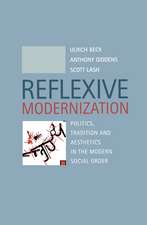The Structural Change of Knowledge and the Future of the Social Sciences
Editat de Ronald Pohoryles, Andrew Sorsen Limba Engleză Hardback – aug 2017
This book was originally published as a special issue of Innovation: The European Journal of Social Science Research.
| Toate formatele și edițiile | Preț | Express |
|---|---|---|
| Paperback (1) | 166.59 lei 6-8 săpt. | |
| Taylor & Francis – 14 feb 2019 | 166.59 lei 6-8 săpt. | |
| Hardback (1) | 698.17 lei 6-8 săpt. | |
| Taylor & Francis – aug 2017 | 698.17 lei 6-8 săpt. |
Preț: 698.17 lei
Preț vechi: 821.37 lei
-15% Nou
Puncte Express: 1047
Preț estimativ în valută:
133.61€ • 137.84$ • 113.08£
133.61€ • 137.84$ • 113.08£
Carte tipărită la comandă
Livrare economică 05-19 martie
Preluare comenzi: 021 569.72.76
Specificații
ISBN-13: 9781138065956
ISBN-10: 1138065951
Pagini: 154
Dimensiuni: 156 x 234 mm
Greutate: 0.45 kg
Ediția:1
Editura: Taylor & Francis
Colecția Routledge
Locul publicării:Oxford, United Kingdom
ISBN-10: 1138065951
Pagini: 154
Dimensiuni: 156 x 234 mm
Greutate: 0.45 kg
Ediția:1
Editura: Taylor & Francis
Colecția Routledge
Locul publicării:Oxford, United Kingdom
Public țintă
Postgraduate and UndergraduateCuprins
Introduction: On the future of social sciences and humanities – a pragmatic perspective 1. Back to the future? From pragmatic approaches in the social sciences to the development of the patchwork theory 2. Social scientists as technicians, advisors and meaning producers 3. Society as an ethical system 4. Travelling concepts and crossing paths: a conceptual history of identity 5. Knowledge, International Relations and the structure–agency debate: towards the concept of "epistemic selectivities" 6. The creative economy: invention of a global orthodoxy 7. In search of experiential knowledge 8. Seeing the wood for the trees: Social Science 3.0 and the role of visual thinking 9. Maps of the uncertain: a new approach to communicate scientific ignorance Obituary: A thank you note and a farewell to our colleagues to whom we owe our success
Descriere
This book tries to overcome the barriers that are built between and within the social science disciplines, and to counteract the unnecessary barriers created by the emergence of "schools of thoughts". It was originally published as a special issue of Innovation: The European Journal of Social Science Research.










